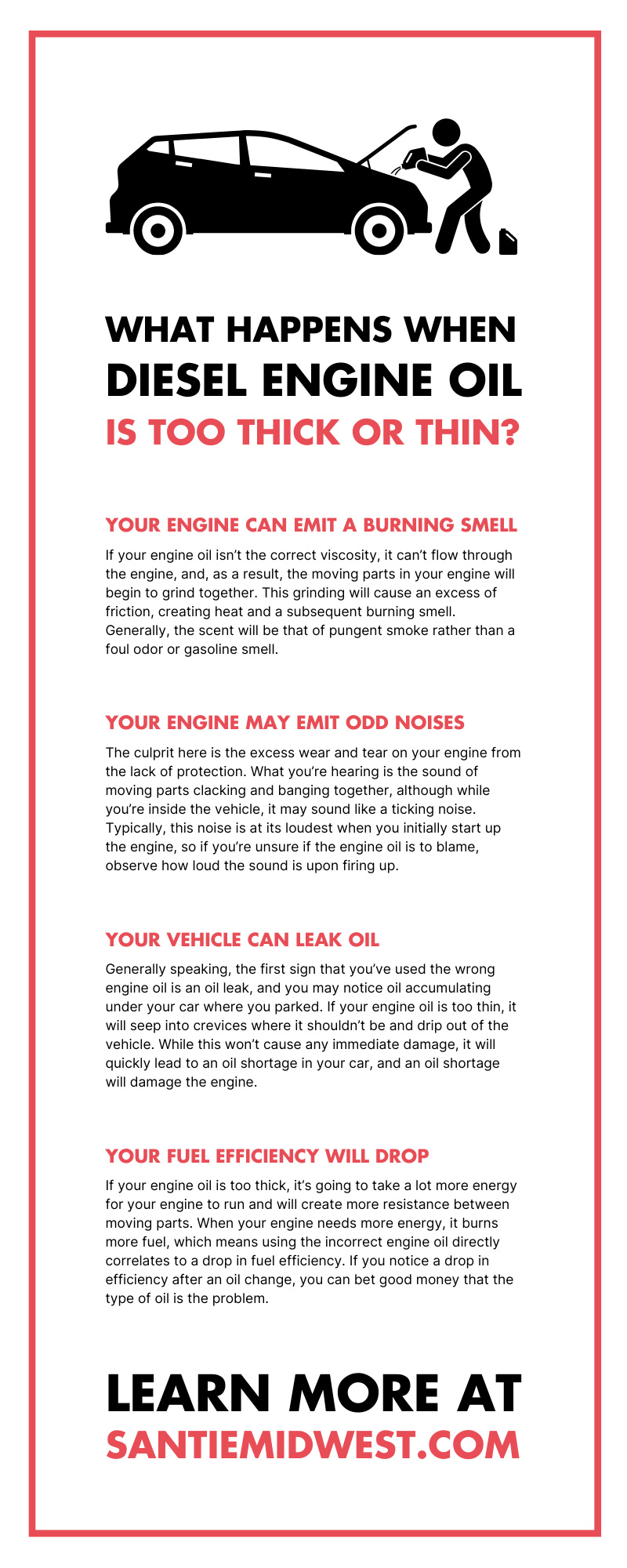If you’ve ever wondered what the numbers on your diesel engine oil container mean, they refer to how thick your oil is during cold and average temperatures, respectively. You may also have noticed that there’s a wide range of numbers, thicknesses, and subsequent formulations. This is because different engine manufacturers require different engine oil viscosities, but why does thickness matter, and what happens when diesel engine oil is too thick or too thin?
What Does Engine Oil Do?
Engine oil consists of either a mineral or synthetic base oil with additives included to increase the effectiveness of the lubricant. These additives can make the oil thicker or thinner at particular temperatures, transfer heat, prevent oxidation, and much more. This is because the overall purpose of engine oil is to help the moving parts of your vehicle glide together while keeping it cool and preventing metal corrosion. If your engine runs out of oil, the parts will begin to grind against one another, stall your vehicle, and damage your engine as a result.
What Is the Difference Between Diesel and Regular Oil?
In order to understand the difference between diesel and regular oil, we first have to look at the engine. Unlike gas engines, diesel engines are more durable, efficient, and longer lasting. Because of this, vehicles that need to carry more weight, handle tougher conditions, and go farther than other vehicles use these engines. Therefore, diesel engine oil has to meet the high demands of a diesel engine and contain more performance additives and detergents to clean out sludge buildup. While putting regular oil into a diesel engine won’t immediately cause damage, regular oil has less sludge control, which will increase the viscosity of the oil. But why does this matter?
Why Does the Thickness of Engine Oil Matter?
In terms of engine oil, thickness refers to viscosity–which is how quickly a liquid flows due to external forces, such as gravity. In order for engine oil to properly flow through an engine, it needs to be of a particular viscosity. Otherwise, the oil can’t serve its purpose. So then, what happens if you use engine oil with the wrong viscosity?
Your Engine Can Emit a Burning Smell
If your engine oil isn’t the correct viscosity, it can’t flow through the engine, and, as a result, the moving parts in your engine will begin to grind together. This grinding will cause an excess of friction, creating heat and a subsequent burning smell. Generally, the scent will be that of pungent smoke rather than a foul odor or gasoline smell. Over time, this will put excess stress on your engine and cause the parts to wear down prematurely.
Your Engine May Emit Odd Noises
Once again, the culprit here is the excess wear and tear on your engine from the lack of protection. What you’re hearing is the sound of moving parts clacking and banging together, although while you’re inside the vehicle, it may sound like a ticking noise. Typically, this noise is at its loudest when you initially start up the engine, so if you’re unsure if the engine oil is to blame, observe how loud the sound is upon firing up. However, for your safety, you should have your car evaluated by a mechanic as soon as possible if you hear any new noises.
Your Vehicle Can Leak Oil
Generally speaking, the first sign that you’ve used the wrong engine oil is an oil leak, and you may notice oil accumulating under your car where you parked. If your engine oil is too thin, it will seep into crevices where it shouldn’t be and drip out of the vehicle. While this won’t cause any immediate damage, it will quickly lead to an oil shortage in your car, and an oil shortage will damage the engine.
Your Fuel Efficiency Will Drop
If your engine oil is too thick, it’s going to take a lot more energy for your engine to run and will create more resistance between moving parts. When your engine needs more energy, it burns more fuel, which means using the incorrect engine oil directly correlates to a drop in fuel efficiency. If you notice a drop in efficiency after an oil change, you can bet good money that the type of oil is the problem.
Your Engine Can’t Start in the Cold
Remember, the numbers on your oil container refer to the thickness of the oil at certain temperatures, as oil can become thicker in the cold. Typically, there are additives used to maintain a particular viscosity level during colder temperatures. However, if you use engine oil that’s too thick, this will cease to matter. The lubricant can seize up in the cold, making it difficult for your car to start. While the heat of the engine may help, it will put extra unnecessary wear and tear on your engine every time you start it.
Your Engine Can Overheat and Become Damaged
While engine oil lubricates and protects moving parts, it also acts as a heat dispersant. As oil flows through the engine, it takes heat with it and cycles it throughout the engine to keep it from overheating. If the engine oil can’t flow through the engine properly, it can’t disperse heat. An overheated engine can get as hot as 250 degrees Fahrenheit. At this temperature, parts can weld together and completely destroy your engine.
What Should You Do if You’ve Put in the Wrong Engine Oil?
If you’ve put in the wrong engine oil, don’t panic. This is a solvable problem, and as long as you don’t run your vehicle for longer than necessary, you reduce your chance of additional damage. Ideally, you’ll pull over as soon as you notice the problem and call a mechanic or tow company. If you can, and the damage isn’t severe, you should drive to the closest mechanic as soon as possible.
If you have your vehicle’s handbook, it should tell you which engine oil you need, and you can change it yourself. However, if you’re even a little bit unsure of what you’re doing, it’s best to leave it to the professionals to avoid any unnecessary harm to your engine.
Now that you know what happens when diesel engine oil is too thick or too thin, take a look at your vehicle’s handbook and OEM instructions, or talk to your local mechanic. Talking to a professional and sticking to the handbook are the best ways to ensure that you’re making the right decisions for your engine’s health. Fortunately, no matter what oil you need, Santie oil can meet all of your diesel engine lubricant needs to protect your vehicle.


